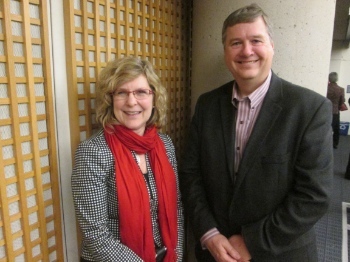
Karen Hamilton and Bruce Clemenger, leaders of the Canadian Council of Churches and the Evangelical Fellowship of Canada, work cooperatively on a number of projects, including ‘Our Whole World.’
Participants from various religious, spiritual and secular backgrounds engaged in conversations in lecture theatres and corridors at UBC Robson Square, over a three-day period earlier this week. They focused on the interests of “bridging the religious-secular divide” and working for “the common good.”
‘Our Whole Society’ brought together mainstream Protestants, First Nations leaders, evangelical Christians, Baha’i leaders, Muslim imams, a Sikh lawyer, Catholic scholars, a small group of Latter Day Saints, Jewish rabbis and many others.
(This report will focus on particular aspects of the conference that are seen to be of interest to Church for Vancouver readers. Many of the addresses will be posted soon to Our Whole Society website. That will enable readers to see the full context of many of the ‘conversations.’)
At the first session, Wade Grant of the Musqueam band greeted attenders with an opening blessing. This was, he said, in line, with their centuries-long tradition of welcoming newcomers to their land. In turn, many of the speakers acknowledged their presence on unceded Coast Salish territory. (The Musqueam, whose traditional territory covers much of the Metro Vancouver area, are among the Coast Salish peoples.)
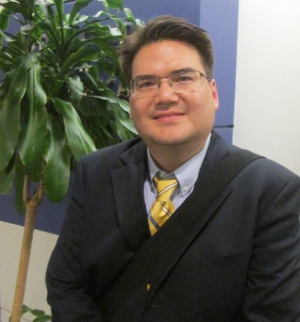
Doug White, former chief of the Snuneymuxw First Nation, gave an impressive speech combining his passion for justice, for his people and for reconciliation.
To conclude the event, late Tuesday afternoon (March 24), First Nations lawyer Doug White, a Snuneymuxw (Nanaimo) former chief and now director of the Centre for Pre-Confederation Treaties and Reconciliation at Vancouver Island University, wrapped up the conference by recounting his own conciliatory pilgrimage. While the content of his message focused on First Nations aspirations and spiritual values, his delivery was warmly reminiscent of homilies delivered weekly in local Baptist or Pentecostal pulpits. He received a unanimous standing ovation.
The conference’s first-night keynote speaker was John Stackhouse, Jr., Sangwoo Youtong Chee Chair of Theology and Culture at Regent College. His presence was acknowledged in the corridors of the event as recognition that evangelical Christians are emerging, despite their reputation for enthusiastic defence of the Christian gospel, as good listeners, understanding spirits and diplomatic communicators.
Stackhouse’s task was to introduce a discussion on the reconciling of religion, secularism and the common good. He began by noting that secularism can be defined in several ways: As “an ideology opposed to religion, a description of social life in a pluralistic society or a preference for political life according nothing to religion.”
He noted that religious life at the time of Confederation seemed pretty simply related to French Catholicism and British Protestantism.
He added that the British North America Act showed Canadians were led by practical people who [needed to] let the British off the colonial hook, keep the Americans out and get through another winter.”
If it could be argued that “there is nothing interesting in Canada,” Confederation succeeded in dispelling that notion, Stackhouse said. It remarkably brought together into one nation French Catholics and English Protestants. This, after 1,000 years of [French and English] trying to subject or destroy each other, [and] Protestant and Catholic after 500 years of trying to convert or excommunicate each other.”
As the years passed, simplicity became more complicated, with the arrival, for example, of people of Jewish, Ukrainian Orthodox and Mennonite extraction, from Europe.
Montreal Reform Rabbi Lisa Grushcow, who shared the opening podium with Stackhouse, explored some of society’s objectives:
- Meaning – “what does life mean”
- Community – “influenced by individualism and commercialism/consumerism”
- Common good – “does my life [form] a part of a ‘bigger project’”
- The fact of difference as a positive challenge to a secular society
Grushcow encouraged Canadians of faith and spirituality to be prepared to “shift from who we aren’t to who we are.” And she offered four cautions in this process:
- She harkened to Josephus, an earlier chronicler of post-Jesus Christianity to recognize the risks of shifting to “who we are.”
- She encouraged people working with emerging issues – such as LGBT – to recognize that, at times, the reality is “questions over answers, uncertainty over certainty.”
- She noted that we need to recognize “how much is at stake – [avoiding] naiveté about how bad the bad can be.”
- She suggested religious and spiritual people had the potential to help delineate between consumption (something necessary for survival) and consumerism (which is shapes the needs of corporate and social groups.)
Grushcow spoke of the ability and need “to [recognize] counter-cultural values” and to, for example, communicate equality values to groups that are “all men” or otherwise all fitting one homogeneous set of parameters.
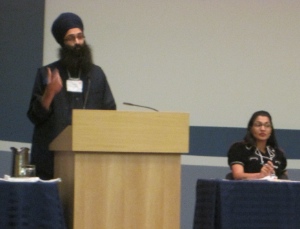
Balpreet Singh, legal counsel for the World Sikh Organization of Canada, pointed out that Sikh founder Guru Nanak was killed for standing up for the human rights of others.
Monday’s sessions began with a focus on ‘Building Our Whole Society.’ The workshops had themes surrounding ‘youth and the spirit of social change’ and ‘walking the path of reconciliation.’ A later plenary moved into the area of religious pluralism in a secular society, with workshops developing themes related to ‘building communities in our cities’ and the ‘values and limits of religious accommodation.’
It was in that context that one of the predicted points of interest in the conference – the current controversy over opposition to the proposed Trinity Western (TWU) School of Law – was woven into the conversation by Paul Bramadat, director of the Centre for Studies in Religion and Society at the University of Victoria.
Bramadat noted that while he himself does not agree with the part of the covenant that limits marriage to one man and one woman, he is quite favourable to the idea of TWU being able to retain the covenant while having a law school. But he added that many of his colleagues and friends – generally broad-minded and rational people – seem to have a profound dislike for the idea of a TWU law school.
One friend, he added, was particularly vocal in her contention that the whole controversy was reflective of what she described as the downside of the Stephen Harper regime.
On Tuesday, Douglas Todd, religion/ethics/spirituality writer for The Vancouver Sun, had presentations at both the morning plenary on ‘Freedom of Religion or Freedom from Religion’ and a workshop on ‘religion and the Canadian newsroom.’
He articulated the benefits of being a “beat” reporter – that is one who works in a specific area, rather than as a general assignment journalist. That gave him the opportunity to learn deeply about the area in which he has specialized most of his career. But it also meant he needed to be well versed, not only in religion or faith, but in “sociology, culture and psychology” because all three of those areas are essential to the full understanding of both religion and spirituality.
Todd noted that when he started covering faith and ethics, he had several colleagues in other papers across the country. Today, as far as he is aware, he is just about the only religion reporter left.
Most of the final afternoon explored the future of interfaith emphases in Canada. Some sessions reflected on iconic writers who had perspectives on religious belief as it relates to larger communities.
One plenary, on the ‘challenge of the post-secular in Canada,’ drew from German philosopher Jurgen Habermas, whose Notes on a Post-secular Society, according to the plenary outline, “describes the persistence of religious belief and communities as signifying a ‘post-secular society’. The persistence of religion in advanced modern societies challenges citizens of different religious and secular backgrounds to communicate in new ways. How can we learn to talk together about the issues of the day without marginalizing religious or secular societies?”
Andrew Bennett, the Canadian Ambassador for Religious Freedom, was also on hand to respond to the “without marginalizing” question. He was careful to note that his mandate, as part of the federal ministry of foreign affairs, is to focus on religious freedom issues in other countries, where a Canadian diplomatic foray can be of assistance.
But he acknowledged that sometimes religious freedom issues that permeate other countries can be echoed in Canada through the presence of people who have moved here from those countries.
Bennett held his ground on the parameters of his role under close questioning from two audience members who were critical of current Canadian foreign policy. He pointed out that, “when I became a public servant in 2001, I took a vow of loyalty.” That vow, he added, causes him to take seriously the task of working within the parameters of his role.
A ‘doing interfaith in a secular age’ workshop reflected on the writings of Charles Taylor and his focus on the idea that “our secular age is one where religion is optional – it is no longer assumed that one is or ought to be religious.” It posed the question: “How can interfaith dialogue get out of this ‘immanent’ frame to bring back the language of the spiritual and the sacred to public discourse?”
The sponsor and host for the event was the Vancouver-based Laurier Institution, billed as a “national, non-profit, non-partisan organization, [with] research and educational activities funded by membership fees, donations, sponsorships and project-based funding.”
Organizers are considering another event for 2017 – maybe in Ottawa, to coincide with the 150th anniversary of Confederation.
The full roster of speakers and workshop leaders included:
- Dr. Andrew Bennett – Canadian Ambassador for Religious Freedom
- Jessica Bolduc – Coordinator, 4Rs Initiative
- Christine Boyle – Director, Spirited Social Change
- Prof. Paul Bramadat – Director, Centre for Studies in Religion and Society, University of Victoria
- Anita Bromberg – Executive Director, Canadian Race Relations Foundation
- Geoffrey Cameron – Principal Researcher, Baha’i Community of Canada; PhD Student and Trudeau Scholar, University of Toronto
- Gianni Castiglione – President, University of Toronto Secular Alliance
- The Rev Dr. James Christie – Professor of Whole World Ecumenism and Dialogue Theology, University of Winnipeg
- Bruce Clemenger – President, Evangelical Fellowship of Canada
- Rabbi Dr. Robert Daum – Advisor, UBC Office of Vice President, Students; Board member, Laurier Institution
- Imam Dr. Zijad Delic – Author, Canadian Islam: Belonging and Loyalty
- Prof. John Dyck – Assistant Professor of Political Studies, Trinity Western University
- Salima Ebrahim – Board member, Inspirit Foundation; Executive Director, Banff Forum
- Peter G Elliot — Dean and Rector, Christ Church Cathedral, Vancouver
- Eric Farr – Project Coordinator, Junior Youth Empowerment Program, Baha’i Community of Toronto
- Dr. Gerald Filson – Director of Public Affairs, Baha’i Community of Canada; Chair, Canadian Interfaith Conversation
- Prof. Shawn Flynn – Assistant Professor of Religion and Theology; Director of Theology Programs, St Mark’s College
- Naveen Girn – Board member, Laurier Institution; Project manager, 100th anniversary of the Komagata Maru
- The Hon. Victor Goldbloom – Former CEO, Canadian Council of Christians and Jews; former Commissioner of Official Languages
- Ginger Gosnell-Myers – Board member, Inspirit Foundation; Aboriginal City Planner, City of Vancouver
- Rabbi Dr. Lisa Grushcow – Senior Rabbi, Temple Emanu-El-Beth Sholom, Montreal
- The Rev. Dr. Karen Hamilton – General-Secretary, Canadian Council of Churches
- Alia Hogben – Executive Director, Canadian Council of Muslim Women
- Dr. Jack Jedwab – Executive Vice-President, Association for Canadian Studies and Canadian Institute for Identities and Migration
- Rabbi Dr. Laura Duhan Kaplan – Interim Director, Iona Pacific Inter-Religious Centre, Vancouver School of Theology
- Prof. Ronald A. Kuipers – Director, Centre for Philosophy Religion and Social Ethics, Institute for Christian Studies
- Dr. Suresh Kurl – Columnist
- George E. Lafond – Treaty Commissioner, Saskatchewan
- Dr. Paul Marshall – Senior Fellow, Center for Religious Freedom, Hudson Institute
- Andrea Nemtin – CEO, Inspirit Foundation
- Prof. Clifford Orwin – Professor of Political Science, Classics and Jewish Studies, University of Toronto; distinguished fellow, Hoover Institution, Stanford University
- Danny Richmond – Program Manager, Inspirit Foundation
- Farid Rohani – Chair, The Laurier Institution
- Prof. Paul Rowe – Associate Professor and Coordinator of Political and International Studies, Trinity Western University
- Jordana Shani – Managing Director, Hillel BC
- Gugan Sidhu – Abbotsford Community Services
- Balpreet Singh – Legal Counsel, World Sikh Organization – Canada
- Prof. John G. Stackhouse – Sangwoo Youtong Chee Professor of Theology and Culture, Regent College
- Doug Todd – Award-winning writer on ethics, spirituality and diversity, Vancouver Sun
- Dr. Justin K.H. Tse – SSHRC Postdoctoral Fellow, Jackson School of International Studies, University of Washington
- Dr. Aileen Van Ginkel – Vice President, Evangelical Fellowship of Canada
- Sukhvinder Vinning – Through Our Eyes Project
- Doug White – Interim Director, Centre for Pre-Confederation Treaties and Reconciliation, Vancouver Island University
- Dr. Marie Wilson – Commissioner, Truth and Reconciliation Commission of Canada
- Rabbi Dr. Yosef Wosk – former Director, Interdisciplinary Programs, Department of Continuing Studies, Simon Fraser University
The conference steering committee included:
- Farid Rohani, Executive Director of The Laurier Institution
- Dr. Gerald Filson, Director of Public Affairs, Baha’i Community of Canada
- Geoffrey Cameron, Principal Researcher, Baha’i Community of Canada
- Prof. Paul Rowe, Associate Professor and Coordinator of Political and International Studies, Trinity Western University
- Hon. Victor Goldbloom, former CEO of the Canadian Council of Christians and Jews
- Alia Hogben, Executive Director, Canadian Council of Muslim Women
- The Rev. Dr. Karen Hamilton, General Secretary, The Canadian Council of Churches
- Dr. Aileen Van Ginkel, Vice-President of Ministry Services, The Evangelical Fellowship of Canada
- Gwen Joy, Program Director, Inspirit Foundation
- Imam Abdul Hai Patel, Director of Inter-Faith Relations, Canadian Council of Imams
- Balpreet Singh Boparai, Legal Counsel, World Sikh Organization of Canada
- Pandit Roopnauth Sharma, founder and Spiritual Leader at Mississauga’s Ram Mandir
The sponsoring organizations, besides the Laurier Institution, were:
- The World Sikh Organization
- The Anglican Church of Canada
- Association for Canadian Studies
- The Baha’i Community of Canada
- The Canadian Council of Churches
- The Canadian Interfaith Conversation
- The Canadian Race Relations Foundation
- The Centre for Israel & Jewish Affairs
- The Christian-Jewish Dialogue of Toronto
- Church of Jesus Christ Latter Day Saints, Vancouver District
- The Evangelical Fellowship of Canada
- The Ridd Institute for Religion and Global Policy
- Trinity Western University’s Religion, Culture & Conflict Research Group
- The United Church of Canada
Editor’s note: We have reworked (on the morning of March 26) the first part of the story, related to professor John Stackhouse and Rabbi Lisa Grushcow. We apologize to the speakers and to readers for having mixed up some of the content of the two talks. You will see some reference to that confusion in the letters below.

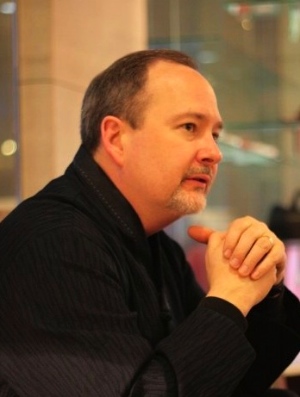
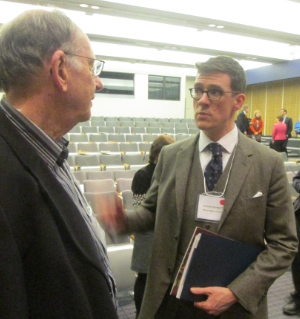
Thanks both to Dr. John Stackhouse and Rev. Louise Cummings for your comments. Thanks, too, for the opportunity to respond. The points John made sent me back to the 25 pages of closely handwritten notes I had taken during the conference. That checkup revealed that I had jumped from page two to page four in my notes, causing me to attribute some quotes to John that belonged properly to Rabbi Lisa Grushcow. The story that now appears above reflects the reassignment of quotes triggered by John’s note.
And, in response to Louise, I would note that the reassignment adds somewhat to the reportage of Lisa’s contribution to the conference. That said, I agree that Lisa told a great story that, as a retired journalist coming from the evangelical end of the communication bridge, I would agree communicates the spirit behind Our Whole Society conference. That was one reason I was grateful for the opportunity to cover it.
Just one thing remains to be said from this corner: There were many good stories told and ideas shared at the conference. I understand a number of them will appear soon on the Our Whole Society website. Please check it out, as a means to place what was reported here into the broader context of what the conference organizers were trying to do.
Rabbi Lisa Gruchcow had a great deal more to say than noted in this summary. She told stories that illustrated the gifts brought to public discourse by people who are both religious and spiritual. We bring the experience of our faith communities in exploring over the centuries a search for meaning, a search for community, and a search for the common good.
She cautioned us about the need to take very seriously the dangerous extremes of our religions.
She ended with a Hasidic tale: there was a person, lost and wandering in a deep wood. He grew more and more anxious, looking for a way out of the woods and not finding it. Then off in the distance, he saw another person. Surely this person would know the way! When he got closer, he discovered that this person was also lost. At first the two of them were in despair. And then they started looking around together. And they said to each other “I tried that path and it goes nowhere..” and “I tried that other path..” and then they went and explored another path together.
I was inspired by her stories to continue exploring new paths with people of different faith traditions, and to keep seeking the common good.
Thanks for this summary, Lloyd. But you were too generous to me, attributing content from Lisa’s talk to me. In fact, everything after mention of Canada’s diversity (the reference to Ukrainians and Mennonites) is from her talk not mine.
And, alas, you quite missed my rather extensive emphasis upon how extraordinary Confederation was: English and French (after 1000 years of trying to subject or destroy each other) plus Protestant and Catholic (after 500 years of trying to convert or excommunicate each other).
I’m sorry I was apparently so dull as to fail to impress you better with what I was trying to say!